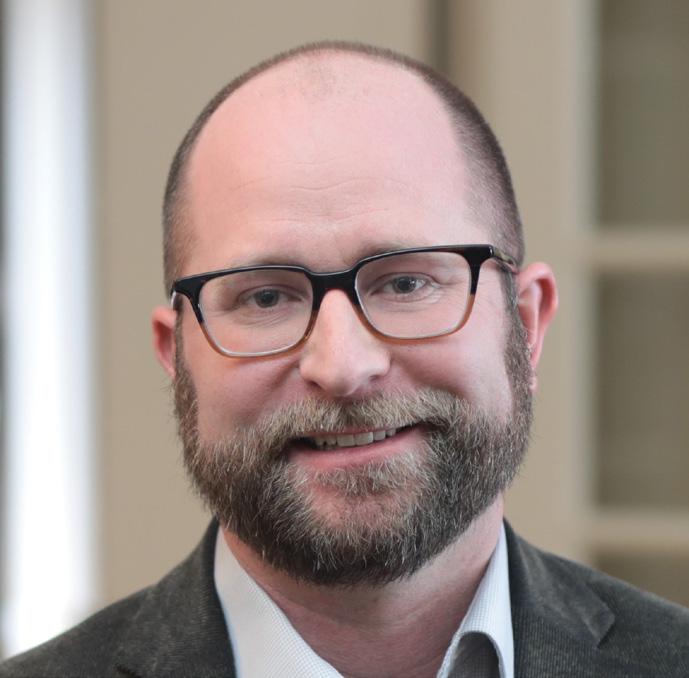
3 minute read
GOVERNMENT AFFAIRS
The Chamber serves as the voice of business for its members in a number of ways. This past fiscal year, advocating for business interests and viability included these highlights.
Interactive session with Deputy
Secretary/COO Sam Rikkers of the Wisconsin Economic Development Corporation. In mid-May, Rikkers presented to the Chamber’s Public Policy Council about business reopening guidelines. That resulted in a virtual learning opportunity we extended to our membership with the Brown County Health Department and representatives from our business community on how businesses could best follow guidelines and reopen safely. Participants included representatives from Hagemeister and Ahlstrom-Munksjo.
The Chamber’s Public Policy
Council continued to meet bimonthly this year. The group, comprised of representatives from various industries, addresses business issues of relevance to our membership and legislative agenda. Southern Bridge. This past year proved to be a pivotal one for the Southern Bridge. To recap, the Wisconsin Department of Transportation (DOT) is committed to designing and constructing a new I-41 interchange that will connect to the Southern Bridge Corridor. Brown County is tasked with conducting the environmental process to determine the location of the Southern Bridge Corridor and obtain a signed record of decision by October, at which time the DOT will take it over to do the design and construction of the interchange as a part of the I-41 expansion project between De Pere and the Fox Valley.
Business Day in Madison. On Feb. 25, a group of community leaders from Greater Green Bay journeyed to Madison to participate in a private panel discussion with local legislators. This was an important opportunity for different industry leaders to speak to how policy impacts their sector as well as to hear firsthand from Wisconsin Manufacturers & Commerce and legislators.
Legislation passes to add industry clusters to the state’s Youth
Apprenticeship program. In March, the Wisconsin State Senate passed Bill 72, legislation the Chamber lobbied on behalf of. This bill signals exciting changes to come for the Youth Apprenticeship program to include new career clusters to explore through the work-based learning program. The Wisconsin Department of Workforce Development (DWD) will release the curriculum associated with these changes at a later date. Once curriculum is completed, the program will provide additional work-based learning placements for area students, increasing the program’s community impact for students and local businesses.
Convening leads to Green Bay city improvements for business
Local government has many roles to play. But when it comes to economic development, I believe our principal responsibility is to construct a reliable and supportive platform upon which businesses and individuals can thrive. That’s sometimes easier said than done, and it’s not something that happens by accident. Last fall, upon my request for support and guidance, Chamber staff convened a task force to tackle this topic with the understanding that lasting change in this area can only occur with a functional and symbiotic relationship between local businesses and city government.
The task force, initially staffed by Jayme Sellen, formerly of the Chamber, chaired by Brighid Riordan of Nsight Telservices and Cellcom and co-chaired by our city’s human resources director, Joe Faulds, gathered for a number of meetings and honest conversations to identify areas in need of improvement. The task force sent out a survey to area business owners and developers with 47 responses and conducted a SWOT analysis over the course of four meetings to gather the information and recommendations. Thanks to the Chamber and interested businesses, we learned a lot about how the City of Green Bay is perceived in economic development terms, where we have shortcomings, and how we can enact the reforms necessary to make our city more hospitable to private investment.
As the result of this effort, the city has:
• identified customer service improvement as our highest priority strategic initiative; • opened regular lines of communication with individual businesses and trade associations to exchange ideas and receive feedback; • created a “Policy Updates” email subscription service; • instituted an “Open Counter” initiative during which business and property developers can
be assured access to relevant professionals in the Departments of Public Works and Community and Economic Development during a set time every week.
Work remains to be done, and, quite honestly, it won’t ever be complete. I assure you this project of continual improvement is one that I will be dedicated to so long as I’m your mayor. I’m incredibly grateful to Laurie Radke, the Chamber and the individual business people who have offered me their advice and insight. I know we will continue to accomplish great things for the community we love as long as we continue to move forward together.




